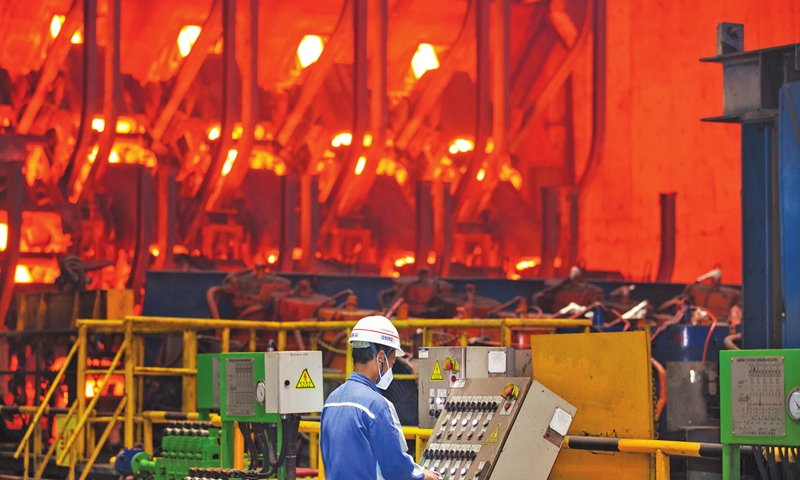
A worker rushes to finish orders for special steel products at a factory of China Baowu Steel Group's specialty steel subsidiary in Maanshan, East China's Anhui Province on Sunday. The company aims to achieve breakthroughs in core technologies this year, with its customized rail transit parts accounting for over 60 percent of the domestic market. Photo: cnsphoto
China has recently completed a test of a new hydrogen-enriched smelting technology using a blast furnace with pure hydrogen as blowing gas source, in an attempt to reduce carbon emissions produced from steel production.
Shanghai University and Changli Xingguo Precise Machine Parts Co based in North China's Hebei Province jointly completed the first development test of hydrogen-enriched smelting blast furnace with pure hydrogen as blowing gas source in China.
The technology is capable of reduce the coke ratio by more than 10 percent, and cut carbon dioxide emissions by more than 10 percent, while the output of iron increased by over 13 percent, according to a report by thepaper.cn.
"The coupling of hydrogen and the traditional iron-making process is one of the key problems in this test," according to Zhang Yuwen, a professor from the School of Materials Science and Engineering of Shanghai University. The redox reaction between hydrogen and iron ore is endothermic, which will cause the blast furnace temperature to drop. How to maximize the use of hydrogen and ensure the furnace temperature remains a technical challenge.
In China, blast furnace iron-making technology is comparatively advanced and production capacity is significant, and the equipment will still be the mainstream supporting the country's huge demand for steel over the next few decades, industry watchers have claimed.
As China has promised to peak carbon dioxide emissions by 2030 and achieve carbon neutrality by 2060, the steel industry remains one of the largest emitters among all manufacturing sectors in China.
In 2021, China's crude steel output stood at 1.03 billion tons, down three percent from a year earlier, data from the National Bureau of Statistics showed in January. It was the first year-on-year decline since 2016.




